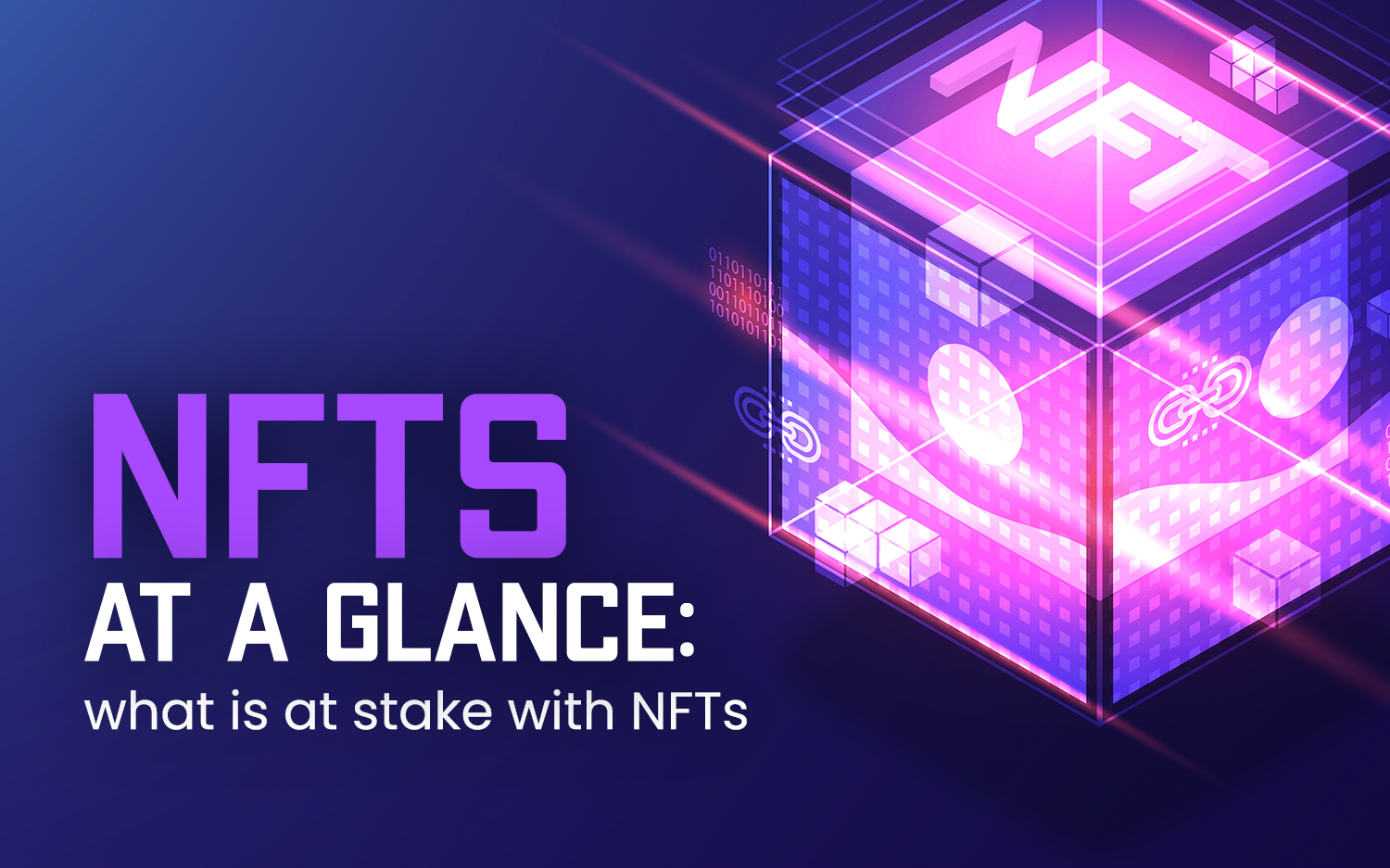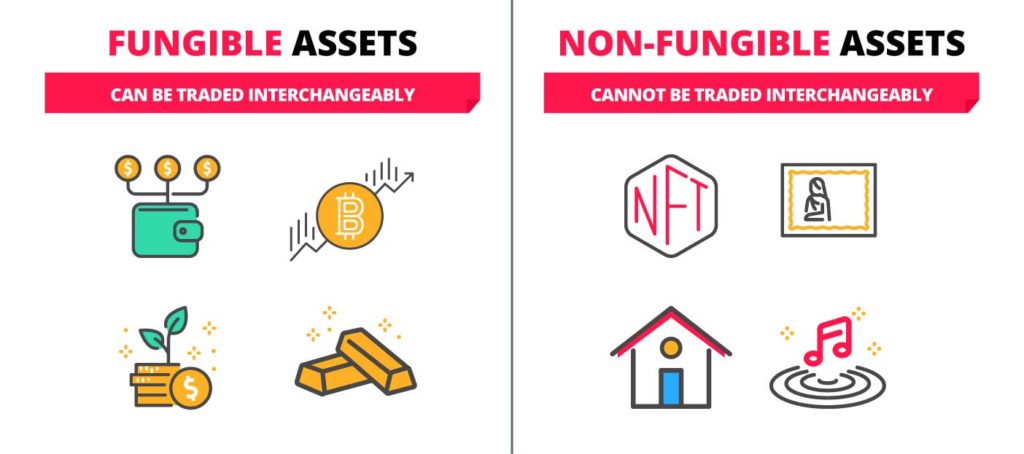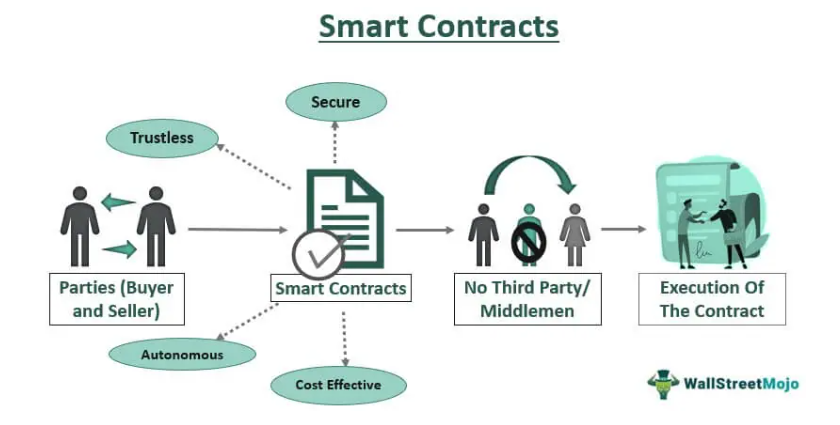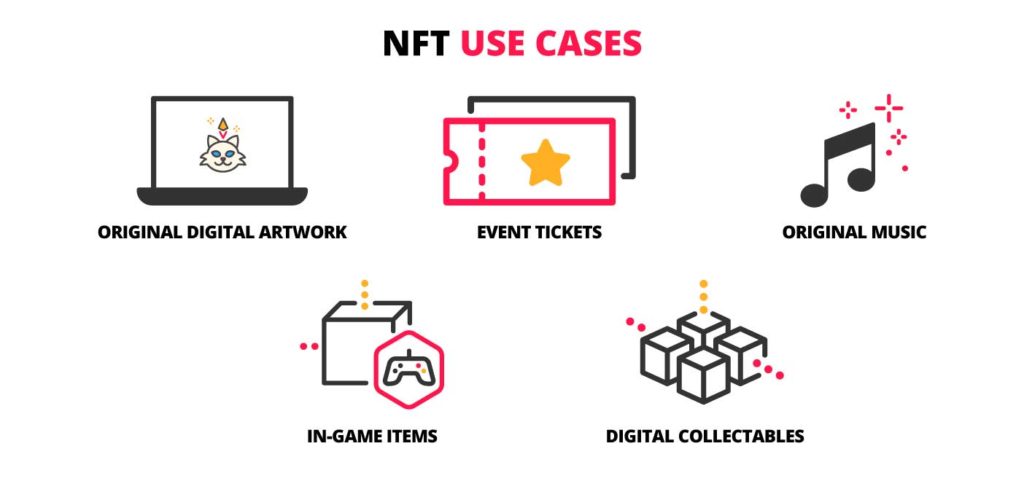NFTs or non-fungible tokens seem to be everywhere nowadays. From art, music, video, digital collectibles to avatars, video game skins, and even tweets, NFTs are selling like crazy. Basically, anything…

NFTs or non-fungible tokens seem to be everywhere nowadays. From art, music, video, digital collectibles to avatars, video game skins, and even tweets, NFTs are selling like crazy. Basically, anything can be converted into an NFT, and that is why NFTs have become so popular when selling and buying artwork and collectibles. So are NFTs mainly for artists and their fans or are there other fields where NFTs can come handy? Sure, there are many other practical uses of NFTs that you should know about, especially if you’d like to get involved in the metaverse or NFT gaming.
How do NFTs work?
First of all, what is non-fungible?
“Non-fungible” means that something is unique and cannot be replaced. Bitcoin and other cryptocurrencies or fiat money are fungible because you can exchange them for another item of the same type, and you’ll have the exact same thing.
A work of art or a trading card is non-fungible or unique, so you cannot replace them for another one because it will be a completely different thing. This is the shortest explanation, and there’s, even more, to know about the difference between fungible and non-fungible tokens.

Now what exactly makes an NFT unique and how do you know it is unique? After all, anyone can easily download or take a screenshot of a digital image, so why would you spend any money on buying it as an NFT?
That’s a very good question, but let’s put it differently: anyone can buy a print of the Mona Lisa, still, there’s only one original in the Louvre (and that, amongst others, makes the Louvre an attractive place to visit). The uniqueness and scarcity of an NFT make it appealing and desirable, thereby increasing its price. This example takes us to another important feature of NFTs: proof of authenticity and ownership.
Technically, NFTs are a unique set of data on the blockchain, which is a distributed public ledger that records transactions. This unique set of data provides immutable proof of authenticity and ownership. NFTs cannot be replicated or transferred without the owner’s permission. They can have only one owner at a time, and with blockchain technology, this is easily verifiable. Transferring tokens between seller and buyer is also very simple thanks to Smart Contracts.
What are Smart Contracts?
We use Smart Contracts to create and trade NFTs – or in more technical terms, to mint NFTs and assign ownership. When you create an NFT, a smart contract automatically assigns the creator as the owner. It contains the owner’s conditions of sale, and automatically executes the transfer when these conditions are met. It will also reassign ownership when someone buys the NFT.
Smart Contracts make creating and trading NFTs easy and simple. There are no middlemen involved in the trading process, which increases transparency and reduces costs.

Practical uses of NFTs beyond art
In popular culture, NFTs have become an efficient way to buy and sell digital artwork. Some will even say that they are a new form of digital art. What is definitely true is that NFTs are like a dream come true for many artists as they can sell their art directly to their fans, without any intermediaries. Smart contracts attached to works of art add functionality to something that is primarily aesthetic: authors can receive funds from initial sales and royalties from subsequent sales.
Beyond arts, NFTs have many other practical applications as they can be linked to any digital or physical asset and provide proof of authenticity and ownership. NFTs are fundamentally a secure method of verification. Thanks to this fact, they have the potential to become a game-changer in many different industries as well as everyday life. Below we take a look at some of the most common and future potential use cases of NFTs.

Identity verification
Individuals, organizations and businesses can use NFTs as a secure way to verify their identity online and prevent fraud. Imagine you can order and buy things, pay taxes, manage your subscriptions and licenses, etc. with one single verification, which is by the way unhackable.
Healthcare and medical records
NFTs can be a safe way to store medical data and still permit authorized healthcare or health insurance providers to access them. Imagine newborns get an NFT Birth Certificate which, besides creating a lifelong identity on the blockchain, records all medical procedures and interventions without compromising patient confidentiality. How amazing would it be to have all this data and medical history in one, secure place that only the authorized can access.
Intellectual property and patents
NFTs are effective in protecting ownership of intellectual property (IP) and patents. Traditional tools like trademarks and copyrights are lagging behind because NFTs can do much more than them. They record timestamps and thereby the full history of an IP. The immutability of the NFT allows the owner to demonstrate any time that they are the author of that content. That goes for patents as well.
Real Estate
Real estate and NFTs are like a match made in heaven. Time-stamped NFTs can document land deeds that determine ownership of a property. They also record transfers of ownership and keep track of property adaptations, as well as value changes over time. Imagine you can learn everything there is to know about the property you’re buying or renting with only a few clicks on your device.
Gaming
Gaming is one of the industries where non-fungible tokens are most widely used. Owning in-game assets like skins and weapons as NFTs gives players control over their assets since they can create, buy, sell them. Ownership of in-game assets not only motivates gamers to keep playing the game, it also increases transparency and security. No one can take away your gaming assets on the blockchain, not even the gaming platform itself. Moreover, gaming NFTs usually have different rarity levels which impacts their value and price. This in turn adds a lot to the excitement of playing the game.
Metaverse
The metaverse is a digital world that replicates physical reality. You can go to places, attend events, socialize, play games, create experiences, do business and also own various assets. Items you can possess in the metaverse like lands, buildings, flats, decoration, and many others are all NFTs so they provide proof of ownership. NFTs also offer different ways to monetize your metaverse assets. You can create unique content or experiences that may open up new revenue streams for you as an individual or a business.
Assets in the metaverse are NFTs
AlphaVerse: Flipping the concept of NFTs
If you’d like to immerse yourself in the metaverse and try out how NFTs work, AlphaVerse is the right place for you. Visitors can enter this unique 3D digital world and explore its attractions absolutely free of charge. You can roam the streets, enter buildings to find exciting experiences, hang out with friends and take part in activities without owning any NFTs.
AlphaVerse comes with amazing potential for individuals, content creators and businesses too. It’s really easy to set up a home for yourself in the metaverse. There you can try out new ways to build and expand your audience, create communities, promote causes you care about, organize events and a lot more. You are in control as you own all your AlphaVerse assets as NFTs. You can buy lands, buildings, and apartments to dedicate them to a theme you love and care about. If you’re creative and inventive, you can monetize your assets in a variety of ways.
As opposed to metaverses which require players to buy expensive NFTs to get started, AlphaVerse is open to all who would like to explore the fascinating world of NFTs no matter the size of their wallet. The prices of AlphaVerse assets range from cheap (a few dollars) to reasonably expensive. There are many other features that make AlphaVerse ground-breaking, read about them here.
Conclusion
Non-fungible tokens are becoming adopted across many industries, beyond arts. The gaming industry and the metaverse are leading the way as the next two sectors that apply this technology extensively. As NFTs are also a state-of-the-art verification method and an unhackable means to provide proof of authenticity and ownership, there’s no doubt other use cases will follow. It’s just a matter of time.
Our next article will cover the exciting topic of minting and hosting NFTs. Make sure to follow our blog to get notified when we post it.
Want to get the latest news on NFTs and the metaverse? Subscribe to our newsletter and follow us on social media.











